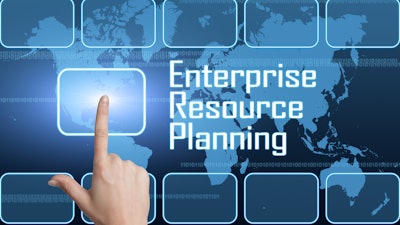
Disruption and transformation are the new normal in the automotive industry: from CASE (connected, automated, shared, and electrified) to COVID, unpredictability is wreaking havoc – whether it is with supply chains, OEM demand forecasts, labor and staffing challenges or the sheer, relentless pace of technical change. In the face of this perfect storm of disruption, what should suppliers do to get ahead of these shifting winds and set a course for smoother sailing in the years ahead?
Technology Implications
Suppliers need to objectively re-evaluate how well their IT capability supports their business strategy. A foundational element in most IT portfolios is usually the enterprise resource planning (ERP) system. In many cases, this has evolved into a patchwork of customized applications using multiple sources of data, tied together with awkward interfaces, requiring significant care and feeding, and providing a sub-optimal user experience. Most importantly, these cobbled-together systems are no longer able to support the real-time, end-to-end visibility, scalability, collaboration and agility needs of the automotive business – which greatly increases the risk of future business disruption.
Auto suppliers need to move away from siloed, inward-focused, monolithic and standalone legacy ERP systems. Historically, these legacy ERP systems have been notoriously expensive, difficult and time-consuming to implement, maintain and use, are not industry-specific, and often leave the supplier beholden to the ERP vendor who requires an all-or-nothing approach to deploying their solution. Furthermore, legacy ERPs are unable to process the vast and growing volumes of newer unstructured data that are key to gaining a holistic view of customers, transactions and business operations.
Instead, let’s look to intelligent, data-driven, collaborative digital platforms with all the critical business capabilities.
The Road Forward
Leading organizations have shifted to ERP as a digital core, architected around business priorities and required capabilities. Accordingly, monolithic ERP applications are no longer the center of gravity for enterprises. Companies now have the option of a more modular, cloud-based “hub and spoke” networked approach, which can adapt and scale in line with business needs. This modular approach – sometimes referred to as composable ERP – is built around an industry-specific ERP solution as a strategic integration platform to supplemental applications, potentially from multiple vendors – as well as to external trading partners, collectively forming a business “ecosystem.” Figure 1 illustrates this concept:
 Figure 1: The evolving automotive ecosystemInfor
Figure 1: The evolving automotive ecosystemInfor
In this model, the industry-specific ERP becomes the foundational digital backbone of the ecosystem, enabling collaboration, agility and innovation at scale. Stakeholders in such an ecosystem need real-time (or near-real-time) role-based visibility and a unified, tailored, and consistent view of information in order to make timely business decisions.
Industry specificity is a critical piece of the puzzle. To shorten time to value and help auto suppliers address their unique challenges and business needs, a modern ERP platform should simplify and/or automate routine transactions wherever possible, while simultaneously providing strategic decision support capabilities. Some examples of auto supplier-specific features include:
- Support for mixed-mode manufacturing – repetitive, job shop, project-based and assembly sequence control
- Demand visibility and forecast management and supply chain management
- Country-specific localizations to enable global operations
- Global track and trace & trading partner collaboration functionality
- Quality management, supplier performance reporting and management
- Prebuilt, auto industry-specific supplier EDI communications and trading partner database
- Integrated operational and financial planning for auto suppliers
- Self-billing and line-side labeling
- Auto industry-specific analytics for tier suppliers
- Integrated product lifecycle management (PLM) and IoT-enabled manufacturing execution systems (MES)
Given the speed of digital business, a multi-tenant cloud architecture is an indispensable element of this strategy, allowing automotive-specific enhancements to be easily added through the cloud and deployed without individual configuration requirements. This enables the system to deliver a dynamic mix of integrated, vertical-specific capabilities which evolve in sync with the latest industry needs. And with a multi-tenant cloud-based solution, one is always running the current software release, instead of constantly playing catch-up with endless patches or major updates. This ensures that every aspect of the enterprise is in sync and operating at the same clock speed.
Of course, data is a key strategic asset that suppliers also need to consider. Most modern ERPs embed technology tools for extracting business value from the massive data streams generated by connected digital ecosystems.
Conclusion
It's not hyperbole to say that auto suppliers face a watershed moment: transform digitally or risk oblivion. Smart, contextual and agile cloud-based ERP platforms are essential for success in the digital age. Suppliers need to reevaluate their technology portfolios based on their fit with current and – perhaps more importantly – anticipated future business needs and develop a plan to evolve them in line with the demands of the industry. It’s also important to keep in mind that, while ERP is not a new technology, it is still an essential tool for running the business. That hasn’t changed, nor is it expected to. What is changing, however, is the nature of ERP – to becoming much more vertical-specific, collaborative, responsive, intelligent, modular and scalable. No longer is ERP a backroom system whose care and feeding was the domain of a select and anointed few. ERP is evolving into the vital, dynamic, beating heart of the connected digital automotive ecosystem.
Peter Maithel is Automotive Industry Principal Analyst at Infor. For further reading, please see https://www.infor.com/resources/data-driven-digital-platforms























